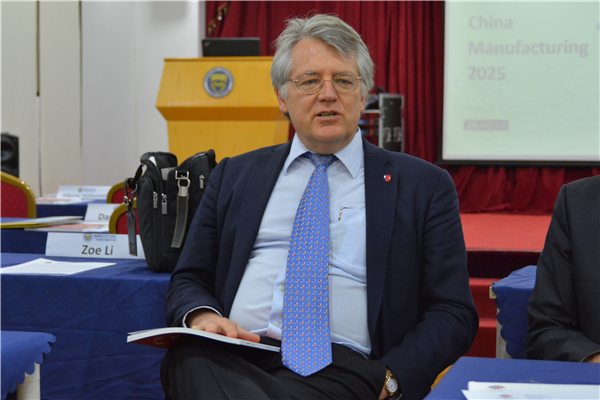The European Union Chamber of Commerce in China has faith that Guangdong can lead the deepening reform and open economy development of China.
The chamber released the a major report examining the effects that the China Manufacturing 2025 (CM2025) industrial policy initiative is having on China’s domestic economy and on its international relations., in Guangzhou on Wednesday.
The report, named China Manufacturing 2025: Putting Industrial Policy Ahead of Market Forces, analyses the initiative’s goals, which include achieving domestic and international market-share targets in ten industries, attaining self-reliance for key components and turning the concept of ‘indigenous innovation’ into reality.

European Chamber President Jörg Wuttke
“I’m very pleased to see the latest development of high-tech and automation industry in Guangdong, like unmanned factory” said European Chamber President Jörg Wuttke. “But it is not just robotics that is the answer, it is also better trained people and better educated people for the work force.”
George Lau, Chairman-elect of South China Chapter of the EU Chamber in China, introduced the dual system for vocational education in Germany. “Those who have the potential to engage in intellectual work will apply for universities and those with strong practical ability will be sent to technique schools. Thus labor force can joint with manufacturing industryseamlessly. Skilled people are the core for the CM2025”.
President Wuttke indicated that he felt the market condition in Guangdong is more flexible than other provinces in China which provides advantages for its enterprises. He also believed that the acquisition of German industrial robotics company Kuka conducted by Guangdong-based manufacturer Midea would have a bright future.
It is worth noting that in President Xi Jinping’s latest instruction, Guangdong is urged to be a support for China’s open economy and a pioneer to construct socialist modernization.
Backgrounder: Chinese regulator’s response to China Manufacturing 2025: Putting Industrial Policy Ahead of Market Forces
The report China Manufacturing 2025: Putting Industrial Policy Aheadof Market Forces also focuses on five of the ten industries covered by CM2025, including new energy vehicles, industrial robotics and semiconductors, and outlines the consequences of government intervention in these sectors.
The report seeks equal treatment for foreign companies under CM2025 It also provides recommendations on how the Chinese authorities can better drive innovation by establishing the market as the decisive force in China’s economy.
On March 11, Chinese regulator offered detailed clarifications on the "Made in China 2025" plan, stressing equal treatment for domestic and foreign companies after a European business group criticized the strategy for discrimination against foreign firms.
Foreign and Chinese enterprises will continue to be treated equally as the country steps up efforts to implement the Made in China 2025 initiative, Miao Wei, Minister of Industry and Information Technology, said.
"The strategy and its related policies are applicable to all businesses in China, be them domestic or foreign," Miao said.
The initiative, which was designed to promote high-end manufacturing in China, adheres to the government-led, market-oriented principles, Miao said.
According to Miao, the Made in China 2025 initiative is in line with common international practices.
(By Keane, 撰文 王凯)
















